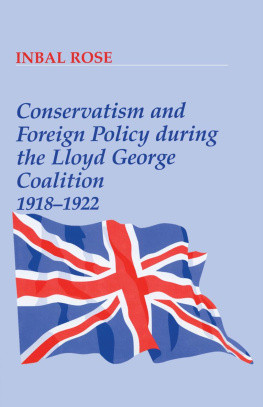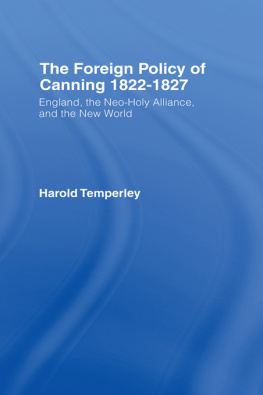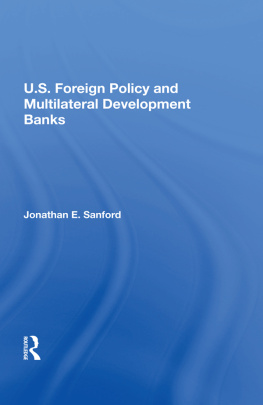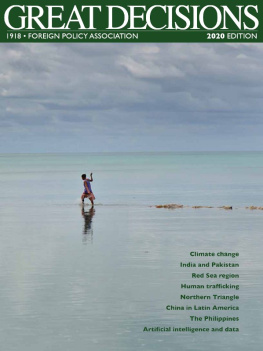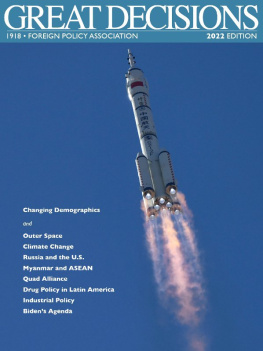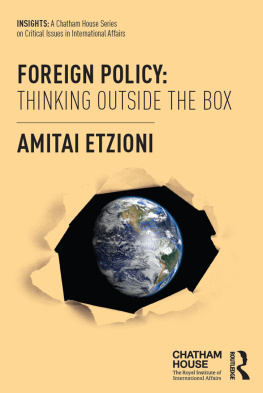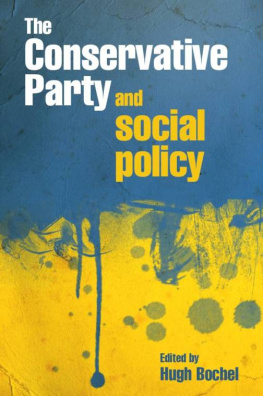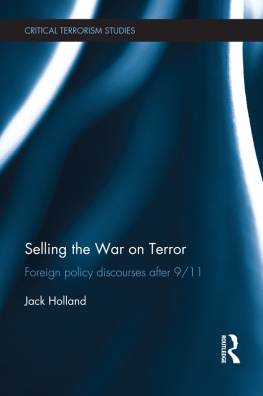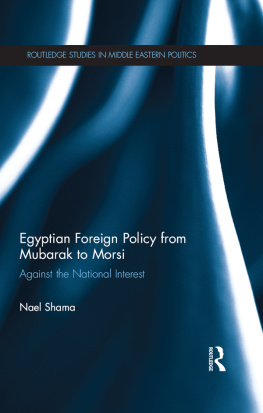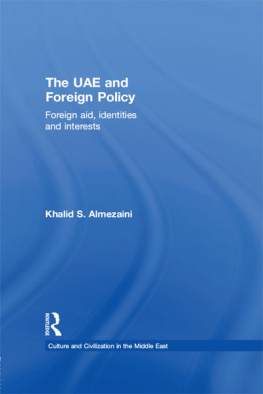CONSERVATISM AND FOREIGN POLICY DURING THE LLOYD GEORGE COALITION 19181922
For Norman and Tslilla Rose
CONSERVATISM AND FOREIGN POLICY DURING THE LLOYD GEORGE COALITION 19181922
Inbal Rose
Hebrew University, Jerusalem
First published in 1999 by
FRANK CASS & CO. LTD.
This edition published 2013 by Routledge
2 Park Square, Milton Park, Abingdon, Oxon OX14 4RN
711 Third Avenue, New York, NY 10017
Routledge is an imprint of the Taylor & Francis Group, an informa business
Copyright 1999 Inbal Rose
British Library Cataloguing in Publication Data
Rose, I.A.
Conservatism and foreign policy during the Lloyd George coalition, 19181922
1. Conservative Party 2. Great Britain Foreign relations 19101936
I. Title
327.4'1'009041
ISBN 0-7146-4868-X (cloth)
ISBN 0-7146-4486-2 (paper)
Library of Congress Cataloging-in-Publication Data
Rose, I.A. (Inbal A.), 1962
Conservatism and foreign policy during the Lloyd George coalition, 19181922 / I.A. Rose.
p. cm.
Includes bibliographical references and index.
ISBN 0-7146-4868-X (cloth). ISBN 0-7146-4486-2 (paper)
1. Great BritainForeign relations19101936. 2. Lloyd George, David, 18631945Views on foreign relations. 3. ConservatismGreat BritainHistory20th century. 4. Conservative Party (Great Britain) I. Title.
DA576.R59 1998
327.41'009'042dc21
98-7955
CIP
All rights reserved. No part of this publication may be reproduced, stored in or introduced into a retrieval system, or transmitted, in any form or by any means, electronic, mechanical, photocopying, recording or otherwise without the prior written permission of the publisher of this book.
Typeset by Vitaset, Paddock Wood, Kent
Contents
| ABCP | Archives of the British Conservative Party |
| BED | British Empire Delegation |
| BL | Bodleian Library |
| BrL | British Library |
| BUL | Birmingham University Library |
| C | Cabinet |
| CID | Committee of Imperial Defence |
| CM | Conference of Ministers |
| DBFP | Documents on British Foreign Policy 19191939 |
| FRUS | Papers Relating to the Foreign Relations of the United States |
| HLRO | House of Lords Records Office |
| IWC | Imperial War Cabinet |
| IWM | Imperial War Museum |
| PD, C | Parliamentary Debates, Commons (except where otherwise stated, all PD references are to Hansard 5th series) |
| PD, L | Parliamentary Debates, Lords (except where otherwise stated, all PD references are to Hansard 5th series) |
| PRO | Public Record Office |
| ULC | University Library of Cambridge |
| WC | War Cabinet |
A great many people helped in the writing of this book. My chief debt is to my thesis supervisor Dr Paul Hayes, who has since sadly passed away, for his constructive advice and friendly encouragement throughout my research. I am equally obliged to Professor Norman Rose, for painstakingly reading the various drafts of the book, and whose comments and suggestions were always illuminating and useful.
I am also indebted to the staff of room 132 at the Bodleian Library Oxford in particular, Mr Colin Harris for their assistance and patience during the many hours I spent there. I am equally grateful to Dr Sara Street, director of the archives of the Conservative Party at the Bodleian Library, for her help in ferreting out invaluable material.
I would likewise like to extend my thanks to the staff of the Public Record Office, Kew, London; the House of Lords Record Office, London; the British Library, London; Senate House, London; the British Library, London; and Birmingham University Library. Their help has greatly facilitated the preparation of this book.
I am particularly thankful to St Antonys College, Oxford, which provided the ideal environment, academically stimulating and socially relaxing, in which to write this work. I am likewise grateful to Beer Sheva University, which offered me a two-year post-doctorate, thus providing me with both the time and the financial wherewithal to prepare the final draft of this book. I would also like to acknowledge my editor, Andrew Humphrys, for patiently and conscientiously nursing this book through to its final stage. Additionally, I would like to thank the various academics and friends who have made helpful comments and suggestions, all of which contributed to the final product.
Finally, I would like to thank by partner Amit Mendelsohn, who silently suffered all the frustrations of living with a working author, yet never ceased to offer me much-needed encouragement and succour. And, above all, I thank my parents for generously and selflessly providing me with all the support, mental and material, vital to endure and overcome the inevitable tribulations of writing a book.
The First World War, enormously bigger than any other war, had left in its wake physical devastation, political chaos and emotional suffering on an unprecedented scale.1 No European country had escaped. France, though victorious, faced a shattered economy and a ruined countryside. Defeated, exhausted and in political turmoil Germany had withdrawn into its borders. The Russian Empire, torn by revolution, appeared on the verge of disintegration. And the Austro-Hungarian Empire had fallen apart while the Ottoman Empire had finally collapsed, their place taken by a succession of small, energetic and squabbling states. The war had reduced Europe to its original atoms.2
In 1918 the victorious powers were faced with the daunting task of rehabilitating Europe. Political boundaries had to be defined, nationalistic controversies defused, economic life reconstructed and internal political disorder calmed. In addition, the pre-war balance of power had now become a thing of the past. Deep shifts of power had occurred, and the old diplomatic importance of Berlin, Petrograd, Vienna and Constantinople could not be maintained.3 This meant that new diplomatic relationships and codes of behaviour, indeed an entire international system, had to be established. Thus, although the task of rebuilding Europe was one of multiple dimensions and gargantuan proportions, it was also a challenge which held out untold opportunities. The peacemakers had to devise a settlement which would not only bring about peace, but which would shape and re-mould the nature of international relations.
Britain, as one of the two leading Allied Powers, was directly confronted with this challenge. In November 1918 Europe was undergoing continuous evolution, and there was the possibility of further, greater and more permanent change. The feeling was that a whole world was visibly passing away before our eyes, and the danger was recognized that unless such spontaneous, often impulsive changes be given some form and direction from above, a setback [might] be given to Europe from which she will not recover for generations.4 Europe required a new political framework and Britain was faced with the task of creating one expeditiously yet cautiously It was a task, as Churchill put it, of great responsibilities.5 In establishing a new system, Britain would have to weigh carefully the details of the peace settlement, not least in terms of their implications for the conduct of its foreign policy.

